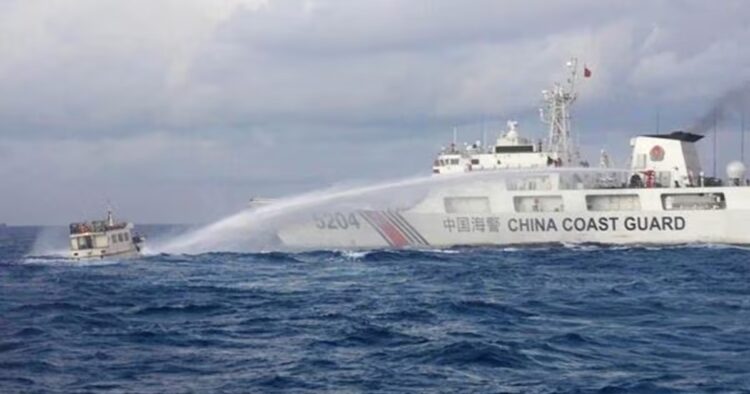In a tense escalation of tensions in the South China Sea, Chinese and Philippine coast guard vessels collided on Tuesday, leaving four Filipino crew members injured. The incident occurred amidst Southeast Asian leaders gathering for an Asian summit, where concerns over Beijing’s aggressive actions in the region were anticipated to be addressed.
According to Philippine officials, the confrontation took place near the disputed Second Thomas Shoal. Chinese coast guard ships, accompanied by other vessels, reportedly obstructed Philippine coast guard and supply vessels, engaging in perilous maneuvers that led to two minor collisions between Chinese and Philippine ships.
The BRP Sindangan, a vessel of the Philippine coast guard, sustained minor structural damage in the collision that transpired shortly after dawn. Approximately an hour later, another Chinese coast guard ship blocked and subsequently collided with a supply boat escorted by the Philippine coast guard, as per statements from Philippine officials.
The clash underscores the longstanding territorial disputes in the South China Sea, where several countries, including China, the Philippines, Vietnam, Malaysia, and Brunei, lay claim to various islands and reefs. China’s expansive claims in the region have frequently led to friction with neighboring nations and drawn international scrutiny.
The incident adds to a series of confrontations and incidents in the South China Sea, raising concerns over maritime security and stability in the strategically vital waterway. The presence of Chinese coast guard vessels in disputed areas has been a consistent point of contention, with accusations of aggressive tactics and intimidation by Chinese forces.
Both China and the Philippines have asserted sovereignty over the Second Thomas Shoal, known as Ayungin Shoal in the Philippines. The area is considered strategically significant due to its proximity to valuable fishing grounds and potential oil and gas reserves, further fueling territorial disputes.
Efforts to manage tensions in the South China Sea have been complicated by the lack of a comprehensive regional agreement on maritime claims. The Association of Southeast Asian Nations (ASEAN) has sought to facilitate dialogue and promote a peaceful resolution to disputes, but progress has been hindered by divergent interests and geopolitical rivalries.
The collision between Chinese and Philippine coast guard vessels underscores the urgency of addressing maritime disputes through diplomacy and adherence to international law. The incident is likely to renew calls for dialogue and multilateral cooperation to prevent further escalation and ensure the peaceful resolution of disputes in the South China Sea.

















Comments